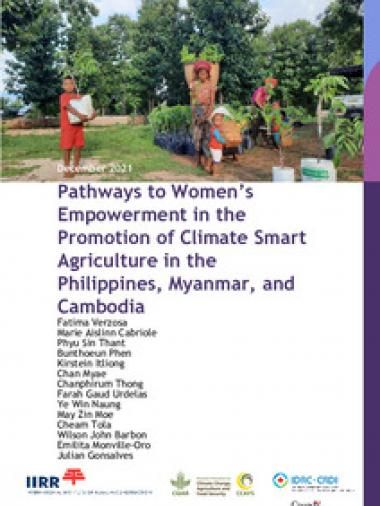Pathways to Women’s Empowerment in the Promotion of Climate Smart Agriculture in the Philippines, Myanmar, and Cambodia

Climate change is not gender neutral. Women are a vulnerable population within a vulnerable population. Far from an equalizing event, climate change risks and disasters often magnify and aggravate existing inequalities in society, including gender inequality. National governments and the international development community recognized that in order to strengthen and accelerate their goals for agricultural development, economic growth and food security they need to build the contributions that women make and take steps to alleviate barriers to women empowerment. A quantitative-qualitative study has been undertaken to investigate how the promotion of climate smart agriculture is contributing to women empowerment within the climate smart villages (CSVs) in Myanmar, Cambodia and the Philippines. The analysis of survey results (n=121) showed that the majority of the women farmers opt to make decisions jointly with their husbands in activities related to agriculture production. Women’s participation in the decision-making process are related to decisions on what crops or crop varieties to plant. Women are more engaged in the decision making related to small livestock such as goats, pigs and chickens, they have gained more experience and knowledge and are able to provide good suggestions regarding livestock. Increased income is a powerful measure of women’s economic empowerment. Across the six CSVs, there is a significant difference in the perceived increase in incomes. The impact of women’s increased income has been equally positive at both the household and community level, with increased involvement in household and production decision-making and increased and more active participation in community activities. Household borrowing and saving have traditionally been the normative responsibility of women. This finding is supported by focus group discussions (n=113) in the CSVs where women are designated as budget planner and keeper of the household income. The study also indicated that the promotion of homestead gardens and small livestock buffered the negative impacts of the COVID-19 pandemic to the households as these activities provided them with food, enabled them to share or sell vegetables to their neighbors, and reserved food for extended lockdowns.
Citación
Verzosa F, Cabriole MA, Thant PS, Phen B, Itliong K, Myae C, Thong C, Urdelas FG, Naun YW, Moe MZ, Tola C, Barbon WJ, Monville-Oro E, Gonsalves J. 2021. Pathways to Women’s Empowerment in the Promotion of Climate Smart Agriculture in the Philippines, Myanmar, and Cambodia. Wageningen, the Netherlands: CGIAR Research Program on Climate Change, Agriculture and Food Security (CCAFS).